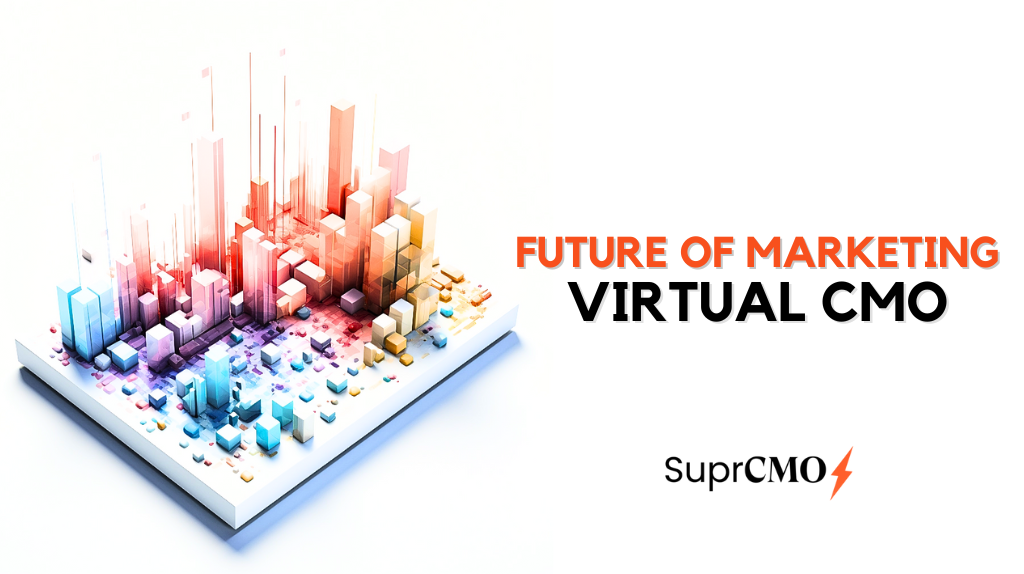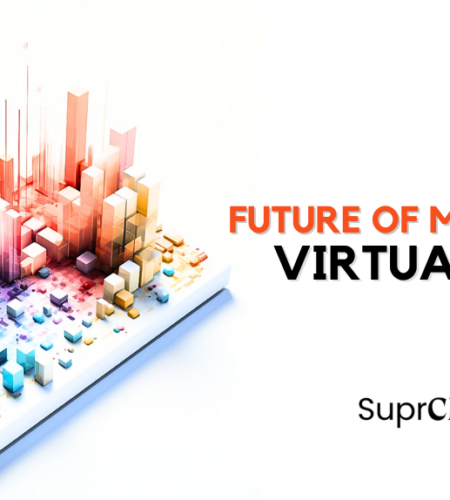
The Future of Marketing Leadership: Virtual CMOs and AI-driven Insights
In today’s rapidly evolving business landscape, the role of marketing leadership is undergoing a significant transformation, driven by advancements in artificial intelligence (AI) and the emergence of Virtual Chief Marketing Officers (CMOs).
These AI-driven Virtual CMOs are revolutionizing marketing leadership by harnessing the power of data-driven insights to inform strategic decision-making and drive business growth. Here’s how Virtual CMOs and AI-driven insights are shaping the future of marketing leadership:
Data-Driven Decision Making:
AI-driven Virtual CMOs leverage advanced analytics and machine learning algorithms to analyze vast data and extract actionable insights.
Virtual CMOs can make informed decisions that drive marketing strategy and business outcomes by interpreting customer behavior, market trends, and campaign performance metrics. This data-driven approach enables businesses to optimize marketing efforts, allocate resources effectively, and stay ahead of the competition in a rapidly changing marketplace.
Predictive Analytics and Forecasting:
AI-powered Virtual CMOs use predictive analytics to anticipate future trends and identify potential opportunities and risks. By analyzing historical data and external factors, such as market dynamics and competitor activity, Virtual CMOs can forecast future outcomes accurately.
This enables businesses to proactively adjust their marketing strategies, allocate resources strategically, and capitalize on emerging trends, giving them a competitive edge in the market.
Personalized Customer Experiences:
AI-driven Virtual CMOs enable businesses to deliver personalized customer experiences at scale. By leveraging AI-powered algorithms, Virtual CMOs can segment audiences based on demographic, behavioral, and psychographic attributes, allowing for targeted messaging and tailored marketing campaigns.
This personalized approach enhances customer engagement, fosters brand loyalty, and drives conversion rates, leading to increased revenue and customer satisfaction.
Marketing Automation and Optimization:
AI-powered Virtual CMOs streamline marketing operations and optimize campaign performance through automation and optimization. By automating repetitive tasks and workflows, such as email marketing, social media management, and ad targeting, Virtual CMOs free up valuable time and resources for strategic initiatives.
AI algorithms continuously optimize marketing campaigns by analyzing real-time data and adjusting targeting, messaging, and budget allocation to maximize ROI and drive better results.
Continuous Learning and Adaptation:
AI-driven Virtual CMOs constantly learn and adapt to evolving market conditions and consumer preferences. By analyzing data in real-time and monitoring campaign performance, Virtual CMOs can identify trends, patterns, and shifts in consumer behavior.
This enables businesses to adjust their marketing strategies quickly, experiment with new tactics, and capitalize on emerging opportunities, ensuring continued success and growth in an ever-changing environment.
Unleashing the Power of Virtual CMOs: Redefining Marketing Leadership in the Digital Age
The digital age has transformed the marketing landscape, and businesses are increasingly turning to virtual Chief Marketing Officers (CMOs) to stay ahead of the curve.
Virtual CMOs, powered by advanced AI technology, offer businesses flexible, cost-effective access to expert marketing guidance. This emerging trend has the potential to redefine marketing leadership and transform the way businesses approach marketing in the digital age.
Virtual CMOs leverage the power of AI to analyze large amounts of data, identify patterns and trends, and generate insights that inform marketing strategies.
They can also automate routine tasks and processes, allowing human marketing professionals to focus on more strategic initiatives. This combination of AI-powered analysis and human creativity and expertise offers a powerful new approach to marketing leadership.
AI-driven Insights: Revolutionizing Marketing Leadership in the Future
Artificial Intelligence (AI) is revolutionizing how businesses approach marketing, and AI-driven insights are at the forefront of this transformation. By leveraging AI’s power, businesses can accessdeep, data-driven insights that can inform strategic decision-making and drive growth.
AI-driven insights are precious in the fast-paced world of digital marketing, where businesses must continuously adapt to stay ahead of the competition.
By analyzing large amounts of data in real-time, AI systems can identify patterns and trends that human analysts might miss. This can give businesses a competitive edge, allowing them to make more informed decisions and stay ahead of the curve.
The Rise of Virtual CMOs: Shaping the Future of Marketing Leadership
The marketing world is rapidly evolving, and the emergence of virtual Chief Marketing Officers (CMOs) is set to reshape the future of marketing leadership.
Virtual CMOs, powered by advanced AI technology, offer businesses access to expert marketing guidance on a flexible, cost-effective basis. This trend represents a significant shift in how companies approach marketing, and it has the potential to transform the role of human marketing professionals in the years to come.
Virtual CMOs leverage the power of AI to analyze large amounts of data, identify patterns and trends, and generate insights that inform marketing strategies.
This allows businesses to make more informed decisions and deliver highly targeted, effective marketing campaigns. Additionally, virtual CMOs can automate routine tasks and processes, freeing time for human marketing professionals to focus on more strategic initiatives.
The Convergence of AI and Marketing Leadership: Virtual CMOs Taking the Lead
The marketing world is rapidly merging with artificial intelligence (AI), and virtual Chief Marketing Officers (CMOs) are at the forefront of this convergence. As businesses increasingly turn to AI-powered marketing solutions, virtual CMOs offer a new paradigm for marketing leadership that combines human expertise with the power of AI.
Virtual CMOs are AI-powered systems that analyze large amounts of data, identify patterns and trends, and generate insights that inform marketing strategies. This approach enables businesses to make more informed decisions, develop targeted marketing campaigns, and stay ahead of the competition.
Embracing AI-driven Insights: Transforming Marketing Leadership for the Future
The marketing world is undergoing a significant transformation as businesses increasingly embrace AI-powered solutions to drive growth and stay ahead of the competition. At the forefront of this transformation are virtual Chief Marketing Officers (CMOs), who leverage the power of AI to provide expert marketing guidance and insights.
Virtual CMOs are revolutionizing the way businesses approach marketing leadership. By combining AI’s speed and efficiency with human marketers’ creativity and intuition, virtual CMOs offer a powerful new way to make strategic decisions and drive growth.
Virtual CMOs: The Next Frontier in Marketing Leadership
In today’s rapidly changing marketplace, businesses must be agile and adaptive to stay ahead of the competition. Marketing leadership is undergoing a significant transformation, with virtual Chief Marketing Officers (CMOs) emerging as a powerful new approach.
Virtual CMOs are AI-powered systems that offer businesses access to expert marketing guidance, data analysis, and decision-making. They can analyze large amounts of data, identify patterns and trends, and provide actionable insights that inform marketing strategies.
The use of virtual CMOs represents a significant shift in how businesses approach marketing leadership. Rather than relying solely on human expertise, companies can now leverage the power of AI to make more informed decisions and stay ahead of the curve.
The rise of virtual CMOs has significant implications for marketing strategy and innovation. By leveraging the power of AI, businesses can develop more targeted, personalized marketing campaigns that resonate with their audience.
Conclusion:
The future of marketing leadership is shaped by AI-driven Virtual CMOs who leverage data-driven insights to inform decision-making, predict future trends, personalize customer experiences, streamline marketing operations, and adapt to changing market conditions. As businesses increasingly embrace AI technology and virtual leadership solutions, Virtual CMOs will be pivotal in driving business growth and success in the digital age.
Frequently Asked Questions (FAQs)
What is the future of marketing leadership?
Marketing leadership is shifting toward data-driven, tech-enabled, and customer-centric roles that prioritize agility, personalization, and ROI over traditional brand-building alone.
How is the role of CMOs evolving?
CMOs are becoming growth strategists, innovation drivers, and technology enablers—blending creativity with analytics and digital transformation leadership.
What are the key traits of next-generation marketing leaders?
They are adaptive, data-literate, tech-savvy, cross-functional collaborators who understand consumer behavior, AI tools, and agile frameworks.
How important is digital literacy in future marketing leadership?
Extremely important. Leaders must understand MarTech stacks, automation, AI/ML, analytics tools, and digital experience design to remain competitive.
What role does AI play in modern marketing leadership?
AI helps leaders automate tasks, personalize campaigns, forecast trends, optimize media spend, and make real-time decisions based on predictive analytics.
Is marketing leadership moving toward decentralization?
Yes. Remote work, freelance ecosystems, and global talent access have driven decentralized leadership models, including Virtual CMOs and fractional roles.
How will customer expectations shape future marketing strategies?
Customers demand personalized, seamless, and value-driven experiences—leaders must build strategies that cater to hyper-personalized journeys.
Why are cross-functional skills critical for future CMOs?
Modern CMOs must work closely with product, tech, data, and finance teams to drive unified customer experiences and business impact.
What is the impact of data privacy on future marketing leadership?
Data privacy regulations like GDPR and CCPA require leaders to build transparent, consent-driven, privacy-first marketing frameworks.
How are content and storytelling evolving under new leadership models?
Leaders now focus on humanized storytelling, purpose-led branding, and content strategies that build trust, engagement, and long-term affinity.
What organizational changes support future marketing leadership?
Flatter structures, hybrid teams, agile marketing squads, and modular outsourcing (e.g., vCMOs, contractors) are becoming the new norm.
What KPIs will define success for future marketing leaders?
Metrics like CAC, CLTV, ROAS, engagement rates, pipeline velocity, and marketing contribution to revenue will outweigh vanity metrics.
How will Virtual CMOs impact the future of leadership?
Virtual CMOs will offer strategic leadership without overhead, allowing businesses to scale flexibly while maintaining executive expertise.
What’s the role of emotional intelligence (EQ) in modern marketing leadership?
EQ helps leaders manage teams, navigate change, foster empathy with customers, and build resilient, people-first brands.
How can marketing leaders prepare for tech disruption?
By fostering a culture of learning, experimenting with new tools, investing in digital infrastructure, and maintaining a test-and-learn mindset.
Will traditional brand marketing still matter in the future?
Yes, but it must evolve. Branding will shift from logos and taglines to experiences, values, and consistent customer interactions.
What leadership models are replacing traditional CMO roles?
Hybrid models like Virtual CMOs, Chief Growth Officers (CGOs), and collaborative leadership pods are replacing siloed CMO structures.
How does DEI (Diversity, Equity, Inclusion) fit into future leadership?
Inclusive marketing leaders create more authentic brand stories and foster internal cultures that reflect diverse voices and perspectives.
What role will sustainability play in marketing leadership?
Sustainability will be integral—leaders must align marketing with environmental and social impact to attract conscious consumers.
How can companies future-proof their marketing leadership today?
By embracing agile structures, investing in talent development, leveraging data and AI, and prioritizing customer-centric innovation at every level.


Comments